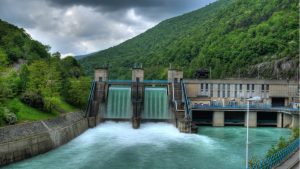American based Debaj Group has entered into an agreement with the Cameroonian government through its local partners Bescam Company Limited to build a hydroelectric power dam in Cameroon. The Memorandum of Understanding (MOU) with the Government of Cameroon represented by the Ministry of Water Resources and Energy (MINEE), for the development of the entire cascade of the Mamfe Basin, Manyu Division for hydropower generation.
Debaj Group Corporation (DGC) is a full spectrum of infrastructure, energy, mining, trading, agricultural, finance, PR initiatives, while Bescam is a Cameroonian Corporation which specializes in renewable energy development with hands-on experience in projects conception and execution.
Initial prefeasibility was carried out by the National Electricity Company in 1983 and they identified six sites for dam construction. Of the six sites, four were studied in detail and have the potential to generate up to 600MW of electricity. The first dam at completion will generate about 240MW of electricity, which is expected to enhance the country’s current installed electricity capacity.
The project will essentially include the following main stages: Pre-feasibility studies (confirmation studies); Bankable feasibility studies; Construction of the first dam; and, Management and sale of electricity for the agreed period. The estimated capital costs for the 600MW hydropower project on the Mamfe basin stand at about $1.6 billion. The estimated capital costs for the 240MW is about $700 million.
Presently, Cameroon has electricity production capacity in Cameroon of about 1,300MW, which is grossly insufficient for the country that needs a minimum of 3GW. Even there are a few other projects in view, but those will still not satisfy the ambitious industrialization program of Cameroon.
The Mamfe Basin is important in many respects, located in Manyu Division, South West Region, near the Nigerian border, it is expected that it would help to boost economic growth within the region.
Moreso, it will have a positive impact not only on economic activities, but also on the social sector by expanding access to health and education, and improving the quality of life. The hydropower will equally contribute to the storage of drinking water as the plant reservoirs will collect rainwater, which can then be used for consumption or for irrigation to boost food production.
In storing the water, the plant will protect the water tables against depletion and reduce vulnerability to floods and droughts. This initiative therefore, offers a vast potential to this part of Cameroon where development is calling. The project will also bolster North-South collaboration, and enhance local capacities as Cameroonians will have in-situ experiences by working alongside foreign experts.
Additionally, it has the potential to become a source of foreign exchange earner for Cameroon as excess electricity can be exported to neighboring Cross River State of Nigeria, thereby, providing the much needed capital to finance social projects and achieve economic self-reliance.
Environmentally, the hydropower development is timely as it is a renewable energy source. The hydropower life cycle produces very small amounts of greenhouse gases (GHG) and helps fight climate changes. In emitting less GHG than power plants driven by gas, coal or oil, the hydropower can help retard global warming.
Because hydropower enterprises are developed and operated in a manner that is economically viable, environmentally sensible and socially responsible, they represent the best concept of sustainable development. That means, “Development that today addresses people’s needs without compromising the capacity of future generations for addressing their own needs” (World Commission on the Environment and Development, 1987).
DGC is looking for an investor/s to update the 1983 studies (prefeasibility) and fund the bankable feasibility of the first dam in the Mamfe cascade
Environmentally, the hydropower development is timely as it is a renewable energy source. The hydropower life cycle produces very small amounts of greenhouse gases (GHG) and helps fight climate changes. In emitting less GHG than power plants driven by gas, coal or oil, the hydropower can help retard global warming. Because hydropower enterprises are developed and operated in a manner that is economically viable, environmentally sensible and socially responsible, they represent the best concept of sustainable development. That means, “Development that today addresses people’s needs without compromising the capacity of future generations for addressing their own needs”.
Debaj Group Corporation (DGC) has good reputation in helping its clientele solve highly complex problems and build and operate systems and facilities that make the world a better place. DGC provides the missing link and thus bridge the geographic, cultural, governmental and business gaps between Africa, the United States, Europe and Asia, as well as aging entrepreneurs.
DGC managers are experts in international project management financing; trade financing, private equity raising, business development and marketing with a Washington insider’s expertise on how to access government programs and political support for international business transactions.
BESCAM Company Ltd is a Cameroonian Corporation specializes in renewable energy development with experience in project implementation across Cameroon.


